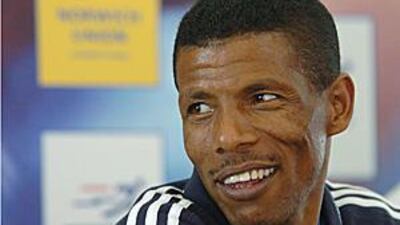There are less than two weeks to go now until the Dubai marathon and I can't wait to get underway again. Last year's race was the first time I had competed in Dubai and it was a fantastic experience for me. I got such a wonderful reception from the crowds and really enjoyed the race. It helps of course that I won, but the course really seems to suit my running style and I am expecting another fast race this year.
My hope is to set another world record in Dubai. I feel like I am in great shape. I have had a good winter's training at home in Ethiopia, and I have even greater confidence now than last year after such a great result in Berlin in September when I broke my own world record. In fact, my preparations for Dubai have been far better than they were for the Berlin Marathon. In Germany, I came into the race having only just recovered from an injury to my leg, where as now I have more than three months of solid training behind me.
The last two weeks of preparation for a big race are a familiar process to me now. Last summer I competed in my fourth Olympic Games in Beijing and, at this point in my career, I really should know what is required to be ready and in the best shape. Needless to say, however, that it doesn't get any easier. I run every day of the year in Addis Ababa, which is at around 2,500m above sea-level. Normally, I run at least 20km a day and the high altitude in my home city really helps my preparations. It is a huge advantage to prepare for a marathon in this way, it allows you to train harder and for longer, and sets me in good stead for what I'm sure will be a very competitive event next week.
In general, the marathon is now the focus of my athletics career. They say that you don't really reach your prime as a marathon runner until you are into your 30s. It is undoubtedly a huge test for anyone, and you never forget the first time you run that distance. Running on the road is a very different prospect to the track - there is no need to worry about running round bends or wearing spiked running shoes for one.
I enjoy taking in the crowds and scenery during a marathon and Dubai is a fantastic location to be running. Aside from training for Dubai, I have had many other obligations in Ethiopia over the past few months. I have been tracking the progress of 14 young athletes from around the world whom I am mentoring in a fantastic global sports programme. G4S 4teen is a team of some of the most promising stars of the future with a common dream of competing at London 2012.
Four of the 14 had qualified to compete in Beijing and in December I was thrilled to have one of them, Pauline Korikwiang, train with me in Addis Ababa for two days. Haile Gebrselassie is the global ambassador for G4S 4teen, helping 14 aspiring athletes to achieve their dream of competing at London 2012. More information www.g4ssport.com

